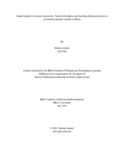Gender equality in science classrooms: teacher perceptions and teaching-learning practices in government primary schools in Dhaka
Abstract
This is a qualitative study exploring teachers’ influences in gender equality in primary science
classes in an urban context. Perceptions and attitudes of teachers in classes directly impact
students’ learning in science as early as in third grade. It is important to understand the
gender-gap and under-representation of girls in science, both academics and career, in
Bangladesh. The research is focussed on teachers’ perceptions and teaching-learning practices
that shape distinguished experiences for boys and girls in the classroom. By convenience
sampling, eight teachers were selected from four government primary schools in Dhaka and
interviewed using an interview-guided approach. Results found that although girls were seen as
better students based on assessments and their completion of work, teachers perceived boys as
naturally inclined to study in science due to having higher-cognitive abilities desired in science,
being more exposed to the outdoors and making more interactions in class to question,
participate, and ask for help.

